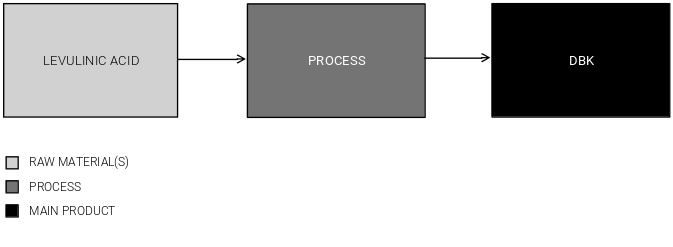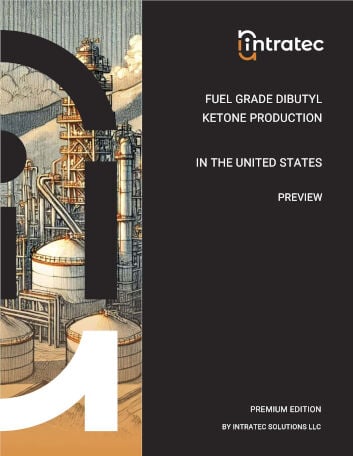Commodity Production Costs Report
Chemical Grade Dibutyl Ketone Production
Dibutyl Ketone Plant Capital & Operating Cost Analysis | United States | Q4 2025
This report presents the economics of Dibutyl Ketone (DBK) production from levulinic acid. The process examined is similar to the one proposed by the University of Wisconsin-Madison. In this process, levulinic acid is hydrogenated over two catalytic beds, forming Fuel Grade DBK (90 wt% purity), which is then purified to Chemical Grade DBK (99.5 wt% purity). Valeric acid (86 wt% purity) is generated as by-product.
The report provides a comprehensive study of Dibutyl Ketone production and related Dibutyl Ketone production cost, covering three key aspects: a complete description of the Dibutyl Ketone production process examined; an in-depth analysis of the related Dibutyl Ketone plant capital cost (Capex); and an evaluation of the respective Dibutyl Ketone plant operating costs (Opex).
The Dibutyl Ketone production process description includes a block flow diagram (BFD), an overview of the industrial site installations, detailing both the process unit and the necessary infrastructure, process consumption figures and comprehensive process flow diagrams (PFD). The Dibutyl Ketone plant capital cost analysis breaks down the Capex by plant cost (i.e., ISBL, OSBL and Contingency); owner's cost; working capital; and costs incurred during industrial plant commissioning and start-up. The Dibutyl Ketone plant operating costs analysis covers operating expenses, including variable costs like raw materials and utilities, and fixed costs such as maintenance, labor, and depreciation.

Product
DBK. Dibutyl Ketone (a.k.a. 5-Nonanone, DBK) is symmetrical monoketone consisting of a nine long carbon chain, with a oxygen bonded on the fifth carbon of the chain. It is an important industrial solvent in chemical manufacture and paints. It potentially can be converted to nonane for use in fuel applications. It can also be used as a chemical intermediate in production of a variety of other compounds.
Raw Material
Levulinic Acid. Levulinic acid is a versatile organic acid used in the production of solvents, plasticizers, and biofuels. Its ability to undergo further chemical transformations makes it valuable in synthesizing various bio-based chemicals. Levulinic acid is produced from the hydrolysis of cellulose and is stored as a liquid. Its applications in sustainable chemistry and as a renewable feedstock position it as a key component in the shift toward bio-based products.
Report in PDF Format
Download & Explore Anytime
Access in Various Devices
Print & Read Comfortably
Share With Co-workers
Up-to-date Report
Professional report based on Q4 2025 economic data, ensuring timely evaluations.
Multiple Use Cases
Ideal for investment screening, feasibility studies, cost estimates, and research planning.
Proven Methodology
Developed using a consistent methodology honed over a decade, ensuring reliable cost analyses.
Report Editions
Content Highlights
Plant Capital Cost Summary
Summary outlining the capital cost required for building the Dibutyl Ketone production plant examined.
Plant Capital Cost Details
Detailing of fixed capital (ISBL, OSBL & Owner’s Cost), working capital and additional capital requirements.
Plant Cost Breakdowns
Breakdown of Dibutyl Ketone process unit (ISBL) costs and infrastructure (OSBL) costs; plant cost breakdown per discipline.
Operating Costs Summary
Summary presenting the operating variable costs and the total operating cost of the Dibutyl Ketone production plant studied.
Operating Cost Details
Detailing of utilities costs, operating fixed costs and depreciation.
Plant Capacity Assessment
Comparative analysis of capital investment and operating costs for different Dibutyl Ketone plant capacities.
Production Process Information
Block Flow Diagram, descriptions of process unit (ISBL) and site infrastructure (OSBL).
Process Consumptions
Raw materials and utilities consumption figures, by-products credits, labor requirements
Process Diagrams
Process flow diagrams (PFD), equipment list and industrial site configuration
Other Dibutyl Ketone Production Cost Reports

Fuel Grade Dibutyl Ketone Production
This report presents an economic analysis of Dibutyl Ketone (DBK) production from levulinic acid in the United States. In this process, levulinic acid is hydrogenated over two catalytic bed, generating Fuel Grade DBK (90 wt% purity).
Details: 1 kta United States-based plant | Q4 2025 | 107 pages | Issue A | From $999 USD
Bundle & Save
Purchase multiple Dibutyl Ketone Production Cost reports and enjoy tiered discounts
up to 10% off!
Could Not Find the Report You Need?
Obtain a Bespoke Report
Get a report targeting the process in which you are interested
See Offer Details
Understand Bespoke Reports and how you can easily order them
Check Editions & Pricing
Complete a brief form and see a quotation for your Bespoke Report
Other Related Production Cost Reports

Fuel Grade Dibutyl Ketone Production
This report presents an economic analysis of Dibutyl Ketone (DBK) production from levulinic acid in the United States. In this process, levulinic acid is hydrogenated over two catalytic bed, generating Fuel Grade DBK (90 wt% purity).
Details: 1 kta United States-based plant | Q4 2025 | 107 pages | Issue A | From $999 USD
+800 Reports Developed, Targeting +250 Commodities
Vast Report Library
858 independent and up-to-date reports examining embryonic and established production processes.
Free Sample Reports
Quickly understand the structure and depth of content of our professional reports.

